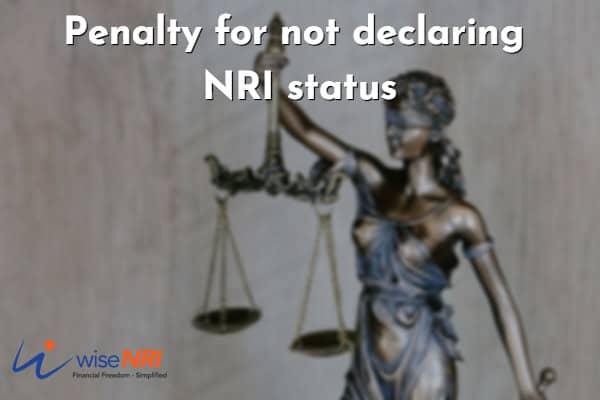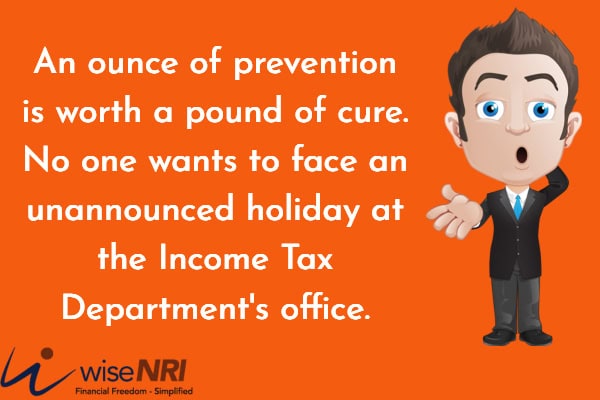As a Non-Resident Indian (NRI), understanding your tax obligations and the importance of declaring your NRI status is crucial. Failing to comply with these regulations can lead to severe financial repercussions. In this post, we delve into the true cost of not declaring your NRI status, the potential penalties you might face, and why transparency is your best ally.

Understanding NRI Status and Tax Obligations
Before we dive into the occasional ocean of fines and penalties, let’s pull out our life jackets and understand what being an NRI really means— because even though the challenges of following rules can be exciting, we all prefer a smoother, easier journey, don’t we?
According to Indian taxation laws, the definition of an NRI is quite straightforward: it refers to an individual who has stayed outside India for more than 182 days during a single financial year. This status significantly impacts tax obligations, as it determines how you’re taxed on income earned both in India and abroad.
The twist, however, is that NRI taxation isn’t just about slapping on a three-letter label like you’re in the world’s most disorganized library. Oh no, it’s far more interesting than that! It’s more about recognizing that your geographical moves have fiscal consequences, and how you handle them can make or break your financial health. Ignorance here isn’t just blissfully expensive—it could lead to legal repercussions you’d rather not experience.
“The hardest thing in the world to understand is the income tax,” quipped Albert Einstein, suggesting even the greatest minds might have preferred tackling the theory of relativity over tax complexities.
NRIs face specific tax liabilities governed by Indian laws, which dictate how domestic income and foreign earnings are considered. For one, any income accrued within India—be it through rental properties, investments, or business—is subject to taxation.
For more insights on this, you might find our guide on new NRI defination helpful.
Understanding your status isn’t just important—it’s necessary. Think of tax liabilities as an uninvited guest at your financial dinner party: you can either feed it with compliance or risk an unwelcome surprise. Failure to adhere to NRI status requirements doesn’t just invite penalties; it also garners undue attention from tax authorities, turning your peaceful financial dream into a paperwork nightmare.
Common Reasons for Not Declaring NRI Status
In the bustling lives of Non-Resident Indians, certain tasks like declaring NRI status can sometimes fall by the wayside. The reasons are varied and sometimes quite relatable. Ignorance is often at the forefront. Many NRIs simply aren’t aware of the obligation to declare their status—after all, they’re dealing with multiple tax jurisdictions and a heap of paperwork that comes with residing overseas. A simple oversight, right? But unfortunately, the consequences of this can be a lot more complicated than forgetting to take out the trash.
Then, there’s the fear of higher taxes. NRIs may assume that declaring their status might open them up to higher tax brackets, especially when they’re familiar with the notorious Indian tax system. What they might not realize, however, is that the Indian government, in certain instances, offers tax incentives to NRIs, which could actually result in paying less tax, not more. Here’s a fun fact: Sections 10(4) and 115H of the Income Tax Act provide specific exemptions and benefits exclusively for NRIs.
And last but not least, plain oversight can rear its head. You might think, “Declaring my NRI status? Out of sight, out of mind!” Longevity in another country can sometimes lead NRIs to set aside responsibilities attached to their native homeland. However, this oversight can eventually lead to penalties that are more financially detrimental than any probable tax benefits originally thought to be avoided.
“In the world of taxes, ignorance is never bliss. It could cost you dearly.” wiseNRI
Under the Indian Income Tax Act, there’s a confiscation alongside penalties which can hit a high note—sometimes reaching up to 300% of the tax dues, not to mention possible legal repercussions—a hefty price for a simple misunderstanding or assumption.
Consequences of Hiding NRI Status in India
Playing hide-and-seek with your NRI status can turn into a legal circus that nobody wants a ticket to. Wondering what could actually unfold? Well, buckle up!
First off, when your NRI status goes unreported, it is often interpreted as tax evasion. Oops! Not only does this mean coughing up hefty fines, but it could also entail legal battles that can be as confusing as a season finale cliffhanger. The Indian tax law for non-resident Indians is crystal clear in its expectations regarding NRI tax filing obligations.
“The risk of penalties and legal battles isn’t worth the fleeting illusion of short-term gains.” – wiseNRI
The stakes are high. Let’s talk numbers: According to the Income Tax Act, failing to declare your NRI status when filing your taxes can result in additional taxes, fines, and even prosecution. T
Consider this: non-filing or incorrect filing can lead to a tax rate of up to 30% on your global income, rather than the slated benefits NRIs are entitled to. Understanding how to utilize DTAA (Double Taxation Avoidance Agreement) is crucial in ensuring you’re not double-dipping into the realm of tax trouble.
Be proactive, declare your status, and sleep easy – transparency today can save you from a tangled web tomorrow.

Exploring the Penalty Structure and Tax Implications
So, here’s the million-dollar question: What happens if you forget (or “forget”) to declare your NRI status? The Indian government isn’t shy about its penalty structure when it comes to non-reporting NRI status.
First up, the financial hit. Think of heavy fines and back taxes on any undeclared income. If the Taxman finds out you’ve stuffed a bit more money under the mattress than you’re supposed to, prepare for not only back taxes but also interest and penalties that might have accumulated over time.
You might be thinking, “It’s just money, right?” Well, hold your horses. The repercussions extend beyond your wallet. The dreaded “potential prosecution” looms for those consistently flaunting the rules.
As author and humorist P.J. O’Rourke aptly noted, “Giving money and power to government is like giving whiskey and car keys to teenage boys.”
In terms of figures, specific penalties can vary. Anywhere between 30% to 200% tax or/and Rs 5000 fine per day to start with.
Legal and Financial Repercussions
Picture this: you’re sipping chai halfway across the globe, and suddenly, you receive an official notice that rattles your nerves more than that unexpected chili in your samosa. Welcome to the consequences faced by many who disregard the necessity of declaring their NRI status to the Indian tax authorities.
Ignoring this crucial step doesn’t merely leave you grappling with financial penalties. True, the financial hits can be substantial; think around 200% of the tax amount evaded, as per Indian [tax compliance laws]. However, the repercussions extend beyond the immediate blow to your wallet. Consider the damage to your credibility as a law-abiding global citizen. The blot on your record might make future legal matters, or even securing loans unnecessarily complicated.
“Taxes are the price we pay for a civilized society.” —Oliver Wendell Holmes, Jr.
The cascading effects don’t stop there. For NRIs, negotiating the tax landscape is akin to a high-stakes game of snakes and ladders. One oversight can lead to hidden penalties for NRI status negligence, resulting in strenuous “ladder slides” down your financial game board. And let’s face it, no one wants to face an unannounced holiday at the Income Tax Department’s office.
Here’s a thought-provoking example: Mr. Ashok (name changed), an NRI, blissfully ignored declaring rental income from his property in India, assuming he was flying under the tax radar. However, this oversight invited not only legal scrutiny but also a financial shelling much heftier than his rental gains.
Ultimately, compliance is not just about avoiding fines or staying on the right side of the law. It’s about understanding your role & resposibility as an honest stakeholder in a global economy that values transparency and accountability.
Steps to Avoid NRI Status Penalties
Let’s face it—nobody enjoys wrestling with tax forms or navigating the maze that is the Indian tax system. However, failing to declare your NRI status can have severe repercussions. But don’t worry, a few straightforward steps can help you dodge those dreaded NRI tax compliance penalties.
First up, don’t wait for a tax authority to come knocking. Proactively declaring your NRI status is the golden rule. Let the income tax department and all financial institutions, including insurance companies, know about any changes in your residential status, whether you’re switching from a resident to an NRI or the other way around.
Think of a tax advisor familiar with NRI tax issues as your trusty guide through this. Regular consultations can illuminate the path ahead, ensuring you comply with all requisite NRI taxation norms. As they say, “Even the most brilliant machine requires skillful navigation,” and in this case, that machine is the complex realm of Indian tax laws for NRIs.
Finally, keep clear documentation of your transactions—be it investments, gifts to resident Indians, or any financial activity that could impact your NRI status.
“An ounce of prevention is worth a pound of cure,” and when it comes to NRI tax compliance, anticipation and preparation can prevent a mountain of future issues.
By taking these steps, you not only avoid penalties but also set yourself up for a smoother, future relationship with the Indian tax authorities. Check – NRI tax rates
 Conclusion
Conclusion

Compliance isn’t just a buzzword—it’s the lifeline that keeps NRIs safe from the rocky waters of Indian tax regulations.
Maintaining compliance facilitates better financial planning—because wresting peace of mind from chaos is always a win, isn’t it?
According to the Income Tax Department of India, failing to disclose your NRI status can lead to penalties that burn a noticeable hole in your wallet, with fines accumulating based on underestimated tax and income discrepancies.
With advancements in digtital tech including AI, keeping abreast of regulations is not just wise—it’s essential. Remember, laughing in the face of tax laws is only fun until the joke’s on you. So, plan wisely, and live financially ever after!
This post about penalties for not declaring NRI status is to make you aware. Talk to your CA, banker, or financial advisor today to take the right steps. Feel free to share if you’ve faced a similar issue or know someone who paid a large penalty for not following the rules.

“I am holding NRI status for last 12 yrs without any break in between. I have all my savings in NRE FD’s . How to save taxes on the NRE FD once I return to India next year ? Please guide .
Also explain me the provision under the RNOR and RFC accounts and how to use the same to save tax”
How and from whom do you I form NRI status?
I want to know how to manage as NRI status?
Is it compulsory to declare Nri status for my wife?